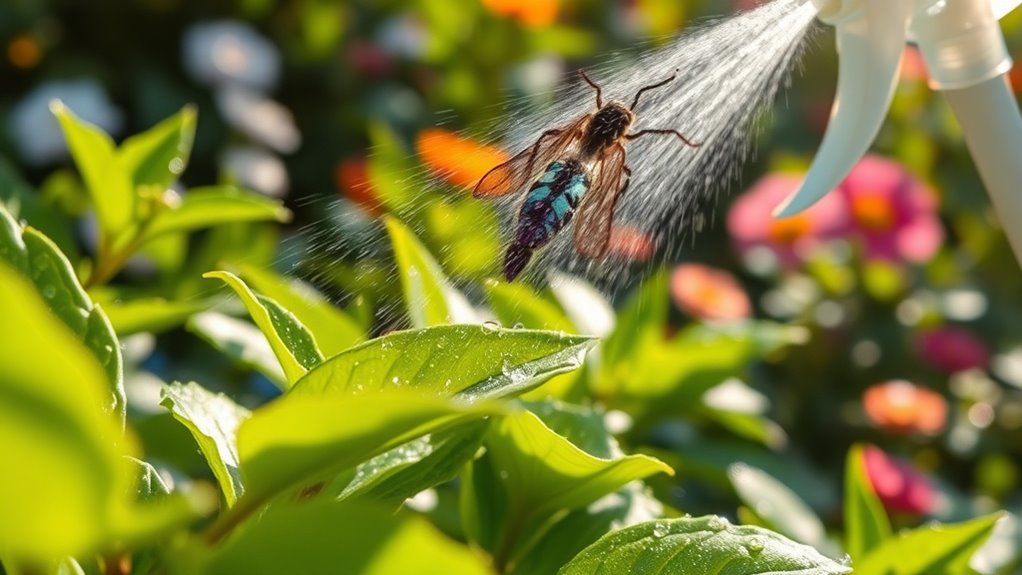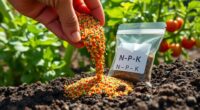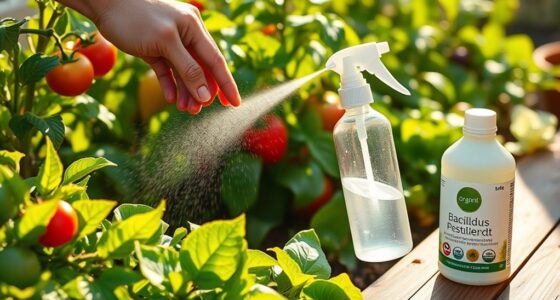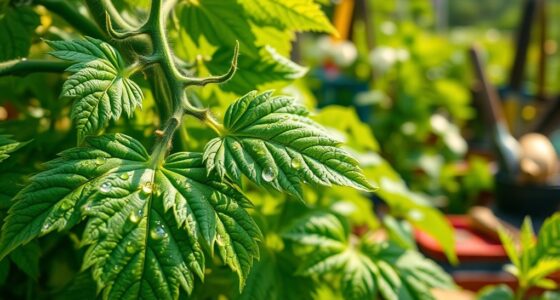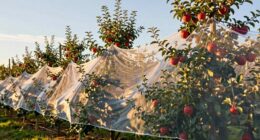To create a simple, effective DIY natural insecticide, mix a mild, organic liquid soap with water and spray it directly onto your plants. Soap sprays work by disrupting pests’ cell membranes, causing them to dehydrate and die. Apply during early morning or late evening to avoid leaf scorch and focus on pests. Using soap sprays supports eco-friendly gardening and helps maintain beneficial insects—if you want more tips, you’ll find helpful details ahead.
Key Takeaways
- Soap sprays disrupt pest cell membranes, causing dehydration and death, making them an effective DIY natural insecticide.
- Use mild, organic liquid soap diluted with water, avoiding fragrances and dyes for safe application.
- Spray during early morning or late evening to prevent leaf scorch and maximize pest contact.
- Regular application helps control pests while supporting eco-friendly, organic gardening practices.
- Soap sprays promote a healthy garden ecosystem by managing pests naturally without synthetic chemicals.
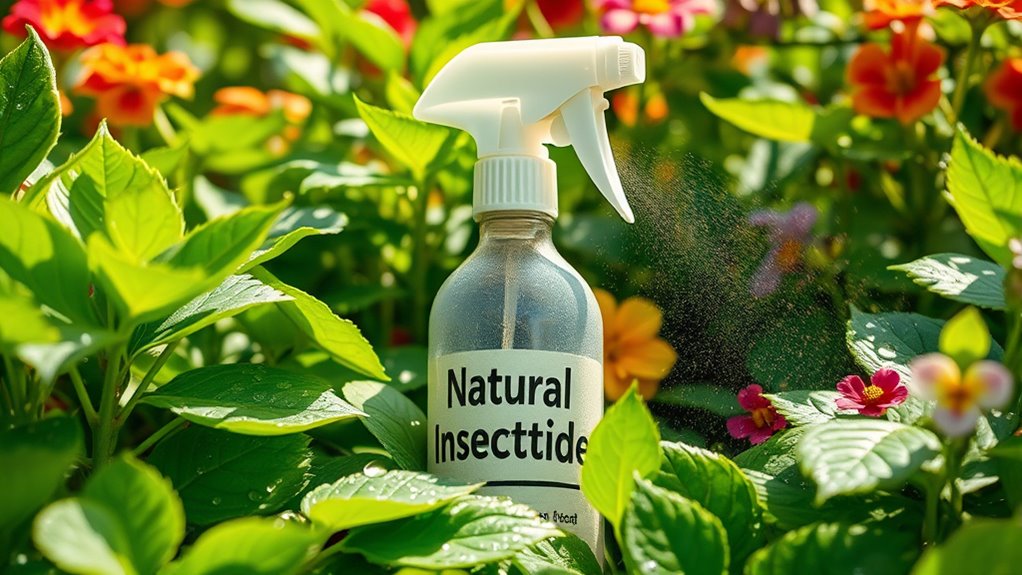
Have you ever wondered how soap sprays work to clean surfaces effectively? When it comes to your garden, soap sprays serve a dual purpose: they can help control pests and support your commitment to organic gardening practices. Unlike chemical pesticides that often harm beneficial insects and the environment, soap sprays offer a natural, safe alternative. They work by disrupting the cell membranes of soft-bodied pests like aphids, mites, and whiteflies, causing them to dehydrate and die. This makes them an ideal choice for pest control techniques rooted in eco-friendly principles. Plus, because soap sprays are simple to make and apply, they fit seamlessly into your organic gardening practices, allowing you to nurture a healthy garden without relying on harsh chemicals.
To prepare your own soap spray, you’ll need just a few ingredients: a mild liquid soap—preferably organic—diluted in water. The key is to choose a soap free of added fragrances, dyes, or antibacterial agents, which can be harmful to plants and beneficial insects. When you spray this solution on your plants, it creates a thin film that suffocates pests and breaks down their protective outer layers. The spraying process is straightforward, but timing is essential; apply the spray during early morning or late evening when the sun isn’t blazing, preventing leaf scorch and ensuring maximum effectiveness. Regular applications, especially when pests are first detected, can help keep infestations under control without resorting to synthetic chemicals. Understanding how high-quality projectors can enhance your viewing experience is also important for creating a truly immersive garden cinema experience.
Integrating soap sprays into your pest control techniques aligns perfectly with organic gardening practices. It’s a method that emphasizes natural solutions over chemical interventions, promoting biodiversity and soil health. When you use soap sprays, you’re actively supporting the ecosystem by protecting pollinators and other beneficial insects that natural pest control techniques often aim to preserve. Furthermore, soap sprays are cost-effective and environmentally friendly, making them accessible for gardeners of all skill levels. As you become more familiar with their use, you’ll notice how simple yet effective they are in managing common garden pests without disrupting the balance of your garden’s ecosystem.
Frequently Asked Questions
Can Soap Sprays Harm Beneficial Insects Like Bees?
You might wonder if soap sprays harm beneficial insects like bees. Generally, soap spray precautions help minimize beneficial insect impact, especially when applied during early morning or late evening when pollinators are less active. Use a gentle, plant-friendly soap and avoid overspraying, focusing on affected areas. This careful approach guarantees you control pests without damaging your helpful pollinators or beneficial insects in your garden.
How Often Should I Reapply Soap Spray for Best Results?
Imagine your garden basking in the morning sun, vibrant and thriving. To keep pests at bay, reapplication frequency matters. You should reapply soap spray every 7 to 10 days, especially after rain, to prevent pest resurgence. Regular reapplication guarantees lingering pests are eliminated while protecting beneficial insects. Keep a close eye on your plants, and adjust the schedule if you notice pests returning or if beneficial insects are affected.
Are Homemade Soap Sprays Safe for Edible Vegetable Plants?
You might wonder if homemade soap sprays are safe for edible vegetable plants. Generally, they’re safe if you focus on plant safety and use a gentle soap formulation, like pure castile or mild dish soap. Avoid harsh chemicals or concentrated solutions. Always test on a small area first and rinse thoroughly before harvesting. When you use proper soap formulation and monitor your plants, you protect your vegetables and keep your garden healthy.
What Are the Signs of Soap Spray Overuse on Plants?
If you overuse soap spray on your plants, you might notice signs of plant stress, such as wilting or yellowing leaves. Leaf scorch is another common symptom, showing as browning or crispy edges on leaves. These signs indicate that the soap solution is irritating your plants, so it’s important to use it sparingly and rinse plants with water if you notice any negative effects.
Can Soap Sprays Be Combined With Other Natural Pest Control Methods?
You can definitely combine soap sprays with other natural pest control methods. Integrating botanical extracts enhances effectiveness, while combining with trap crops attracts pests away from your main plants. Just make sure to apply these methods thoughtfully, avoiding overuse. Using soap sprays alongside these strategies creates a synergistic effect, providing a thorough approach to pest management that’s safe and eco-friendly for your garden.
Conclusion
Now that you know how to make soap sprays, you’re armed with a simple, natural weapon against pests. Think of it as your garden’s gentle shield—taming bugs without harming your plants or the environment. With a little spray here and a quick rinse there, you’ll keep your garden thriving and pest-free. It’s like giving your plants a invigorating bath, ensuring they stay happy and healthy all season long. Happy gardening!
